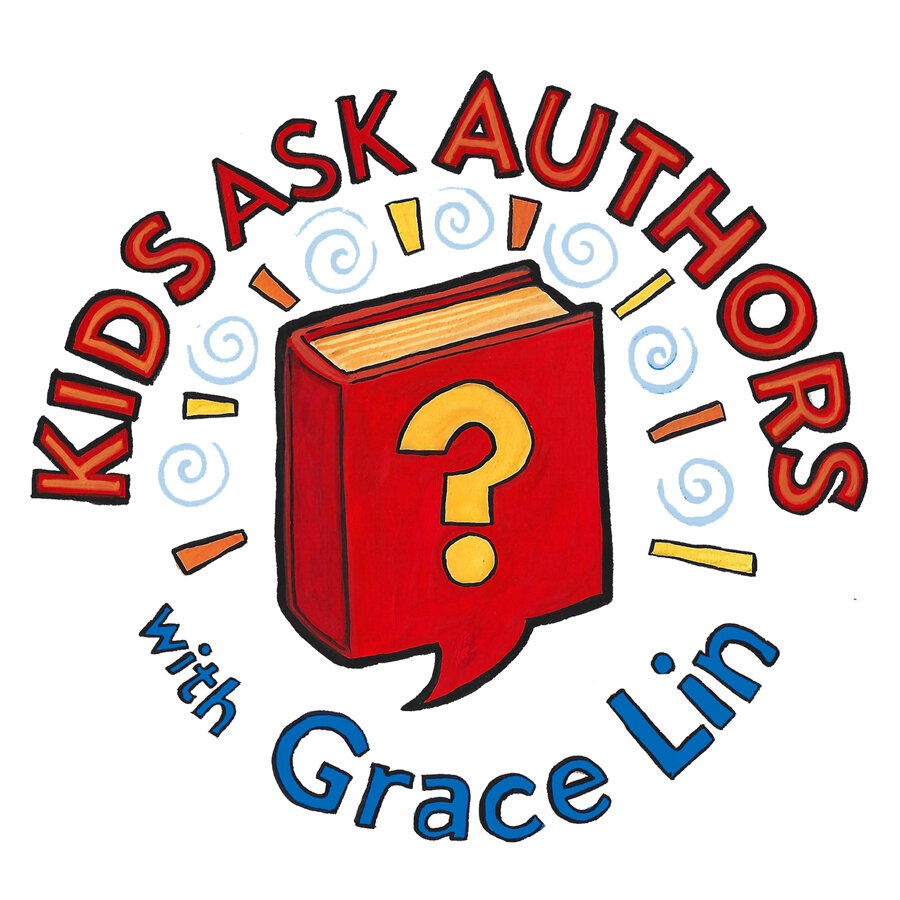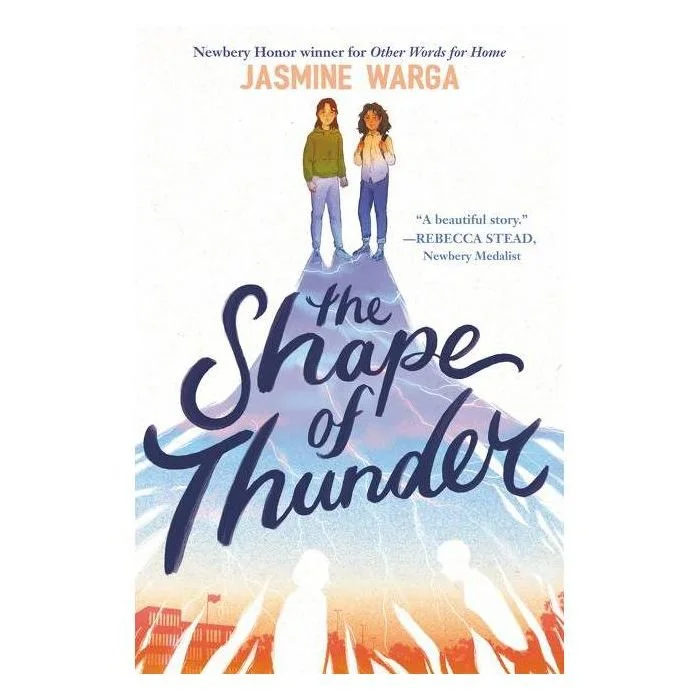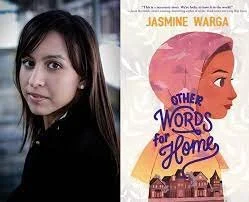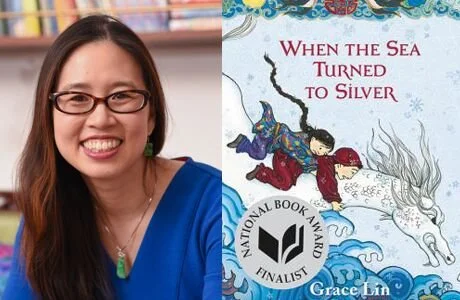Episode #101: What are the biggest changes you’ve made from first draft to a published book? -with Jasmine Warga
Welcome back! We are back from celebrating out 100TH!!!!! episode! Thank you for continuing to join us and support this podcast. On this week’s episode, authors Grace Lin and Jasmine Warga answer this kid question: “What are the biggest changes you’ve made from first draft to a published book?”
TRANSCRIPTS:
Grace Lin: Hello. I'm Grace Lin, children's book author and illustrator of many books, including the middle grade novel When the Sea Turned to Silver and the picture book A Big Mooncake for Little Star. Today, I am here with Jasmine Warga, the author of middle grade novels like Other Words for Home and The Shape of Thunder. Hi, Jasmine.
Jasmine Warga: Hi, Grace.
Grace Lin: Thank you so much for coming on today's podcast.
Jasmine Warga: Oh, yay. I am so excited to be here. Thank you for having me.
Grace Lin: Okay. Are you ready for today's kid question?
Jasmine Warga: Yes, I am.
Grace Lin: Okay. Today's kid question is from a kid named Sarah, and Sarah asks...
Sarah: What are the biggest changes you've made from first draft to published book?
Grace Lin: What are the biggest changes you've made from first draft to a published book?
Jasmine Warga: Well, Sarah, that's a really great question. And probably the answer is actually for my novel Other Words for Home. The book was originally not in verse. And what I mean by that is the final copy of the book is actually a collection of poems. Every chapter is a different poem. But when I was first writing the book, and for a long time, from several drafts, not just the first draft, but the second draft, the third draft, to even the fourth draft, we're all in prose, which is kind of just your normal paragraphs. And late in the game, I decided that the book needed to be in verse and rewrote the whole book in verse. So that's probably the biggest change though.
Jasmine Warga:
I am a messy writer, and so my books change a lot from first draft to final draft. It's very common for me to have characters change in substantial ways and plot threads and all those things. But probably changing the book from prose to verse would be the biggest change I've ever made from a first draft to a final draft.
Grace Lin:
Wow. That is a big change. Was there something that kind of instigated that change?
Jasmine Warga:
Yeah, I think that it was I had an idea in my head of how Jude, who's the main character of the book, voice sounded. And it just was not coming across on the page. There was such a big gap between what I had in my head and what I was getting out on the page. And then I realized that perhaps if I put it into verse, I'd be able to capture some of the lyrical and texture of Arabic, even though it was a book that was obviously going to be written and read in English. But I wanted to sort of capture that feel. And I feel like by putting the book in verse, I was able to sort of remove the narrative distance that existed between Jude's voice and the reader when it was in prose.
Grace Lin: Wow. So you mentioned you went through many drafts before you did this. How many drafts do you think you went through before this came to you to change it to verse?
Jasmine Warga: Wow. It had gotten really far. It was maybe a draft four or draft five. We were getting really close to the book. I think my editor and I thought maybe we have one more round of big, heavy edits before it's going to go to copy edit. So we were really, the book had been workshopped a lot and we'd really been working on the book for a long time. It was sort of a last-minute pivot.
Grace Lin: Well, kids love to know what a long time is. Can you give them a more specific [crosstalk 00:03:22]?
Jasmine Warga: Oh, yes, of course. Sorry. So here would be the timeline. I had been working on the book, actively writing the book from sort of fall of 2016 to fall of 2017 before I made the change. So almost a whole year. But I had been thinking about the book as a prose novel in my head, brainstorming it out for two years before I started writing. So I would say I was thinking of it as a prose book and sort of working on it as a prose book for three years before it occurred to me to switch the book into verse.
Grace Lin: Now, did your editor protest or anything because that's kind of a last-minute change? I know a lot of writers and even students would feel kind of scared to make that kind of change so late in the game.
Jasmine Warga: Yeah. Well, I first broached the issue with my agent who I think at first thought that I had sort of lost my mind, but then I think she heard something in my voice on the phone, a conviction about it and said, "Okay, well, send over a couple of pages and I'll see what I think." And I think she was thinking I'm going to have to really sort of handle this situation and let Jasmine know she's bonkers.
Jasmine Warga: But amazingly, she saw what I saw and said, "Okay, I think you're right. Let me talk to your editor." And my editor, to her credit, was super game and was super about wanting me to feel like I was putting out the best version of the book that I could. And I'm really grateful to her for that. She's always really great about that, of having an extraordinary amount of patience with the idea being that we both always want the best book possible for young readers that we can do and understanding that sometimes that means postponing it because I have to do a lot of heavy lifting or revising.
Grace Lin: Wow. That's wonderful. And how much more time did it take to make the change?
Jasmine Warga: Yeah. So I'd say the book was, I think the book got pushed back to publication season. So it took me maybe about another nine months of working on it in verse before it went to copy edits. And I think that went faster because, well, I was rewriting the entire book, I already knew these characters so well, and also had a general sense of the storyline and the plot arc. So that made it write faster probably than if I'd been trying to write a brand new story from scratch in verse.
Grace Lin: Wow. That's really amazing. I was trying to think of if I had anything as dramatic as you, as for changing from first draft to published book. And I don't think I have anything as dramatic. I know my biggest problem has, in the past, not so much anymore, but in the past has been making my books thick enough. I know when I first started writing novels, because I started doing picture books first, my editor's like, "You need to write at least five descriptions on each page here. You've got no description." And I remember that was a big change.
Grace Lin: And then I know when I wrote Where the Mountain Meets the Moon, there's a secondary storyline of the parents in that book, and originally that wasn't in there in the first draft. And I remember my editor's like, "I think we need to make this book a little thicker." I was like...
Jasmine Warga: Yeah.
Grace Lin: And I was like... Which, of course, strangely enough, I don't have that problem now. It's more like I think we need to cut this down and make it thinner.
Jasmine Warga: It is funny how that goes, right? I feel like it's either a process of sort of beefing it up or trimming it back. And I've definitely had both experiences that you're talking about, of having something that seems a little bit flimsy and needing more subplot and other content. And then things where I think my editor's like, "Oh, there's way too many things going on here. We need to really scale it back."
Jasmine Warga: So, no, this question when I saw it, I was like, oh wow, I have a lot of things that I could say because I think my first jobs never look anything like the finished book, which I always want kids to understand, especially young writers because that's something I didn't understand when I was a young writer was how many different drafts and how much work goes into the book that you're reading off the shelf and so not to feel discouraged when you're sort of comparing your stories to what you're finding on the shelf...
Grace Lin: Yeah.
Jasmine Warga: ... which is something I didn't understand at all as a kid.
Grace Lin: Yeah. They think, you think that, when I was a kid, I thought like, oh, it just came out magically and it was exactly like it was in the book.
Jasmine Warga: Yes.
Grace Lin: Whatever they wrote in the notebook was just magically put on the typewriter into a book. And that's not the case at all.
Jasmine Warga: Yeah. No, I totally had that same understanding.
Grace Lin: Just out of curiosity, which do you like better, beefing a story up or cutting it down?
Jasmine Warga: I think I like beefing a story up because I think it's fun to try to figure out the other kind of hidden passageways within a story, if that makes sense...
Grace Lin: Mm-hmm (affirmative).
Jasmine Warga: ... and sort of discovering, chasing your curiosity. So there might have been a secondary character who wasn't that well developed and sort of figuring out what their role in the story is, or like you were talking about with the parents and sort of figuring out the subplots.
Jasmine Warga: I always find it hard to trim back because you get attached...
Grace Lin: Mm-hmm (affirmative).
Jasmine Warga: ... to these other characters and their journeys. And it's hard to know sort of what, I feel fraught with a lot of sort of nervous writer energy about am I cutting the right things? Am I cutting something that readers would've really liked? You know, for me, that always feels so much more high stakes. Adding to me always for some reason feels, I feel less pressure around making a choice because I think when you're cutting, at least for me, my experience has always been I'm trying to weigh two different subplots sometimes and sort of decide which one...
Grace Lin: Yeah.
Jasmine Warga: .. is the one to keep. And that sort of is more anxiety provoking to me than the sort of the joy of just creating because I feel like that gets back to that sort of the messiness of drafting, which I actually really kind of like the drafting part of just...
Grace Lin: Yeah. I agree.
Jasmine Warga: … the first brainstorm kernel.
Grace Lin: Yeah. I like beefing things up, adding more, though I do think cutting is easier in a weird way. It's easier to cut, but it's more enjoyable to add. It's very emotionally painful to cut though. The actual cutting process is not as difficult. It's like, oh, okay. I guess we just get rid of that.
Jasmine Warga: Yes. No, no, no, you're definitely right that it's less time-consuming. But it definitely is something that keeps me up at night wondering about it and wondering if... You know, when you now, I feel like then I know so much more about these characters than that is actually in the book.
Grace Lin: Yeah.
Jasmine Warga: And I spend a lot of time [crosstalk 00:10:19].
Grace Lin: So was it hard for you to cut down for Other Words for Home when you changed it to verse then because I imagine that was a cutting-down process?
Jasmine Warga: Oh yeah. It certainly was. And it was, I think it was a little bit different in that since I was totally rewriting the book, I'm using this whole new language and structure. But it was, in a way I was interrogating and thinking, okay, I don't have now 10 paragraphs to be able to introduce this character. I had to distill them down to their most important essence and sort of choose. So yeah, it was, it definitely was difficult.
Jasmine Warga: But that, again, for some reason, it felt different than it does for me when I'm working in a prose book and in cutting big swaths of texts, because here again, it kind of had that sort of joy and spark of recreation. I was making something new, which always feels a little bit easier for me than just the trimming. But there was definitely that part. And I think that in some ways I now wonder if I would be able to ever write a verse novel initially knowing it was a verse novel because I think it helped me. It was almost like all this character brainstorming work I'd done in the prose book, prose version, which then helped me sort of pick what details to share about the characters because I did have all of this work that I'd done prior.
Grace Lin: Wow. That's amazing. But a hard way to write a book.
Jasmine Warga: Yes. Always, always. I feel like I always choose the most difficult route.
Grace Lin: Yes.
Jasmine Warga: I mean, I need to do better about that.
Grace Lin: But it was definitely worth it. So thank you so much, Jasmine, for this wonderful interview and thank you for answering Sarah's question. And thank you Sarah for asking such a great one.
Jasmine Warga: Yay. Thank you, Grace. And yes, thank you Sarah for your wondering question.
Grace Lin: Bye.
Jasmine Warga: Bye.
The kid BOOK REVIEW today comes from Zeeva! Zeeva is reviewing, “The Shape of Thunder” by Jasmine Warga:
Hi, I’m Zeeva, and the book I would like to talk about is The Shape of Thunder by Jasmine Warga. This book is about two girls named Cora and Quinn. Cora and Quinn used to be best friends, but after Cora’s older sister Mabel died from a school shooting that Quinn’s brother caused, they stopped speaking to each other. One day though, Quinn finds an article that says time travel might be possible. She does more research on the topic and immediately sends the information to Cora. The two of them start working together to see if they can travel back in time to fix all of the things that went wrong. I love how this book touches on so many themes. One theme is the issue of school shootings and the social and emotional impact that has on students on all sides. This book also has a lot about time travel, so it’s a mix of science and fantasy, which is very fun to read. Another reason why I loved this book is because it has amazing figurative language. Almost every paragraph has an element of figurative language that really helps you visualize and feel what is happening to the characters. I absolutely loved reading this book, and if you like books with suspense you then will enjoy reading The Shape of Thunder!
More about today’s authors:
Jasmine Warga is the author of the New York Times bestseller Other Words For Home. Other Words For Home earned multiple awards, including a John Newbery Honor, a Walter Honor for Young Readers, and a Charlotte Huck Honor. She is also the author of young adult books, My Heart and Other Black Holes and Here We Are Now, which have been translated into over twenty different languages. The Shape of Thunder, her most recent book for middle grade readers, is a Junior Library Guild selection and Indie Next List Summer 2021 pick. Her next novel, A Rover’s Story, will be out in Fall 2022. Jasmine currently teaches in the MFA program at Vermont College of Fine Arts. Originally from Cincinnati, she now lives in the Chicago-area with her family.
Grace Lin, a NY Times bestselling author/ illustrator, won the Newbery Honor for Where the Mountain Meets the Moon and her picture book, A Big Mooncake for Little Star, was awarded the Caldecott Honor. Grace is an occasional commentator for New England Public Radio , a video essayist for PBS NewsHour (here & here), and the speaker of the popular TEDx talk, The Windows and Mirrors of Your Child’s Bookshelf. She is the co-host of the podcast Book Friends Forever, a kidlit podcast about friendship and publishing (geared for adults). Find her facebook, instagram , twitter ( @pacylin) or sign up for her author newsletter HERE.
Thank you so much for tuning into to Kids Ask Authors! We would appreciate your continued support on our Patreon page! Please consider becoming a member for all kinds of exclusive perks. https://www.patreon.com/kidasaskauthorspodcast
Order the 2022 WTMMTM CALENDAR: https://shop.carlemuseum.org/category/books/autographed-books/grace-lin
Sign up for Grace's author newsletter: https://lp.constantcontactpages.com/su/kEmJMT3/newsletter



